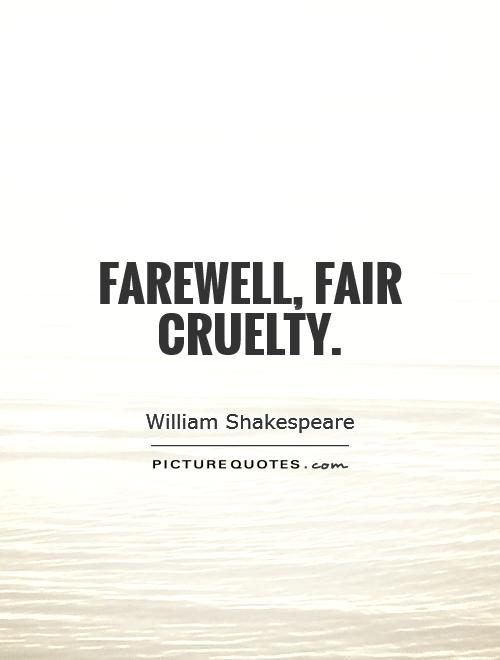Farewell, fair cruelty

Farewell, fair cruelty
"Farewell, fair cruelty" is a line from William Shakespeare's play "Twelfth Night." In this context, the phrase is spoken by the character Viola, who is disguised as a man named Cesario. Viola is in love with Orsino, the Duke of Illyria, but she is unable to express her true feelings for him because of her disguise. The line "Farewell, fair cruelty" reflects Viola's conflicting emotions as she struggles to navigate the complexities of love and identity.Viola's use of the word "farewell" suggests a sense of resignation or acceptance of her situation. She knows that she must bid farewell to her hopes of being with Orsino, as her disguise prevents her from revealing her true feelings. The word "fair" in this context can be interpreted as both beautiful and just, highlighting the bittersweet nature of Viola's love for Orsino. Despite the pain of unrequited love, Viola acknowledges the beauty and fairness of the situation, even if it is cruel.
The word "cruelty" in the line "Farewell, fair cruelty" speaks to the heartache and torment that Viola experiences as she grapples with her love for Orsino. Viola's disguise forces her to endure the cruelty of concealing her true self and suppressing her emotions. The paradoxical nature of the phrase "fair cruelty" encapsulates the conflicting emotions that Viola feels – the beauty of her love for Orsino juxtaposed with the pain of unattainable desire.
Shakespeare's use of language in this line captures the complexity of human emotions and the struggles of love. Viola's poignant words resonate with anyone who has experienced the agony of unrequited love or the challenges of concealing their true feelings. "Farewell, fair cruelty" is a powerful reminder of the enduring themes of love, identity, and the human experience that Shakespeare masterfully explores in his works.












 Friendship Quotes
Friendship Quotes Love Quotes
Love Quotes Life Quotes
Life Quotes Funny Quotes
Funny Quotes Motivational Quotes
Motivational Quotes Inspirational Quotes
Inspirational Quotes